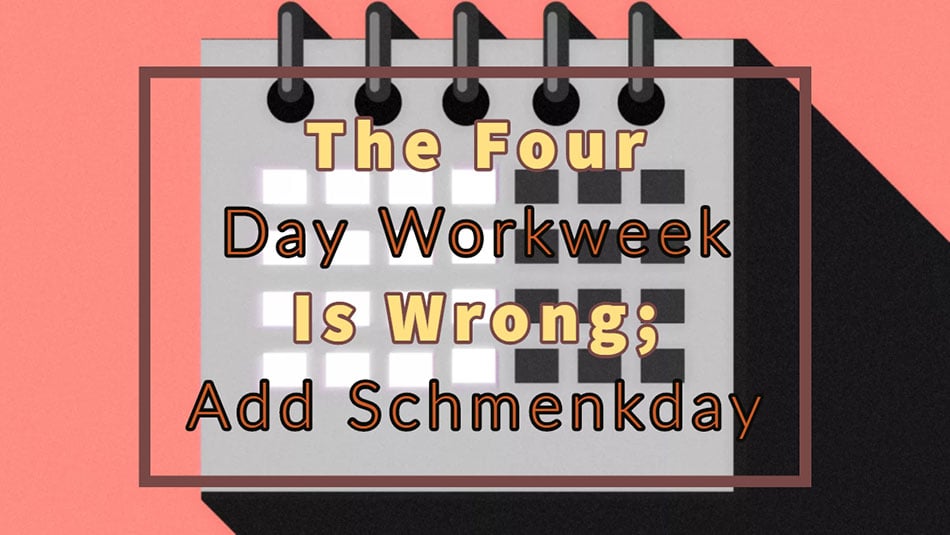Any Google search will show you endless results and proof that the international trend is towards four-day work weeks.
The premise is simple; instead of working 5 days every week for 8 hours per day, we shift to 4 days per week for 10 hours per day. Thus, employers don’t lose working hours and/or productivity, while employees gain an entire extra day every week to be with their family, run errands, exercise, enjoy their hobbies, travel, shop, help others, or just rest. In a world where seemingly everyone complains that there simply isn’t enough time to get everything done and/or simply enjoy life, time is our greatest commodity, and the addition of more of it, leads to a happier and more productive work force.
And across the globe where the idea has been tested, the theory has borne out. In Japan, Microsoft saw their productivity increase by 40% and their electricity costs were reduced by 23% after shifting to the model. Hundreds of companies in New Zealand, the United Kingdom, and Romania have all implemented the four-day week with similar results; all reporting the experiment as being “beyond successful.”
Even in America, where the idea is anathema to our very way of life, multiple companies have begun experimenting with the idea with overwhelmingly positive results.
But there’s a problem. Actually, there are multiple problems, almost all of them based in the fact that America is allowing the world to lead on this project; a policy that has proven to be historically disastrous when it involves cultural shifts. The rest of the world either violates civil rights at every turn (and therefore is not part of this discussion for obvious reasons), or is the opposite; far too focused on political correctness and coddling people at every turn. Thus, in countries where the four-day work week is working, they have quickly shifted to the idea that working 10 hours per day is “too difficult) and have already begun to segue to 32 hour work weeks (and are seeing declines in their productivity…DUH). Additionally, there is the aforementioned engrained American model of the 5-day work week for traditional, mainstream business models.
Thus, the answer is simple; rather than shifting to a four-day work week, merely add a day to every week.
More than a decade ago, I began espousing the creation of Schmenkday, an 8th day of each week, which would allow those who wanted it to have a three-day weekend almost every single weekend of the year.
The name is irrelevant. I was put on the spot as I theorized the need for and workings of a permanent three-day weekend and I spit out the word “Schmenkday.” I don’t care what it’s called, I just want it enacted; and it seems as though more and more Americans agree with me. Surveys consistently reveal that the nation is short on time in all aspects of their lives and the one thing they want more than anything would be three-day weekends.
While the case will be hard (in truth, impossible) to make to the world, the selling points are endless. For starters, the current two-day weekend is far too short. Americans work longer hours and live farther from work than ever before. The average suburbanite doesn’t even get home to start his or her weekend until after 6pm on Friday, and must leave to begin the new week by 6am Monday morning; that’s 60 total hours off. 24 of those hours are spent sleeping, leaving just 36 hours, just a day and a half, to relax, complete chores, be with friends and family and get drunk. Much of this, I believe, explains the common phenomenon of “Sunday Night Anxiety,” something I have always called the “Sunday Night Blues.” It’s that impending feeling of doom brought on by the necessity and resentment that comes with having to begin another work week before we’re each ready to.
I have found that “Sunday Night Blues,” don’t exist when the weekend is 3 days. Most of us, after 3 days off, are ready, in some cases even eager, to get back to work. It’s amazing the difference a day makes. To help eliminate the stigma associated with Sunday, we’ll add Schmenkday to the end of the weekend, turning Sunday into the middle night. This will also make Sunday football parties more raucous and free spirited because most people won’t have to go to work the next day, Schmenkday.
For those amongst us who don’t want a third day off on the weekend, there will be plenty of jobs available. Remember, Schmenkday is just an 8th day of each week, not a weekly national holiday. The nation must still work, thus not only insuring the survival of the economy but in my theory, spurring an additional thriving of the economy and creating the need and demand for endless new jobs.
Think about it; a third weekend day will cause more people to shop, dine out, travel, see movies, and consume while still more people will be working and making additional funds. It’s a perfectly designed capitalistic idea which will also allow those of us still working 5-day weeks to be more refreshed, rejuvenated and productive when we do work. There is no downside. In the entertainment world alone, thousands of jobs and billions of dollars will be created by the need for weekend mirroring of what we currently do. There’ll be an instant creation of “The Tonight Show Weekend,” with a different host and theme, and copycats will follow. With Schemkday, so many people will shift to flex schedules that while we’ll all be working 5 full-time days, every day will be a weekday for about 33% of us; thus the need to for normalcy across all days, while not taking away the special feel of our 3 days off.
Oh sure, there will be calendar anomalies, but to make things as easy as possible, we will add 48 days to each calendar year. We don’t need a Schmenkday added to Memorial, Labor, President’s and Thanksgiving weekends and the addition of 48 days makes it mathematically easier to simply add 4 days to each calendar month. This will also ensure that each year will always have 413 days, thus allowing the creation of a new creed, 24/7/413. Cool, huh? (and yes, I am aware this is a mathematical nightmare in practice. Let the nerds hash that part out).
All of the details and objections to a permanent three-day weekend have answers:
*We won’t be in tune with the rest of the world? Who cares? America sets the agenda, it doesn’t follow it. Let’s enact it, and watch how quickly the world falls line.
*The creation of an 8th day won’t actually create jobs, it will just force the working of America to work more overtime. Not true. Part of the brilliance of my idea is that no currently existing laws governing fatigue, sweatshop conditions or overtime will be changed, thus protecting the current labor force while creating new opportunities for part-time work for those who want it.
The list goes on and on and the world has already proven that the premise is sound. It’s time for us now to do what we do; show them that while their idea is “cute,” we have a bigger and better way to do it. Schemkday! Schmenkday! Schmenkday!
http://www.azcentral.com/business/articles/1109biz-talker-ON.html
http://www.nbc30.com/health/10137688/detail.html
https://www.nrn.com/fast-casual/shake-shack-expands-four-day-work-week-test










